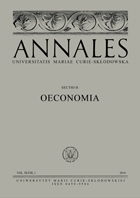Does the Sustainability of the Country Differentiate the ESG
of Companies and How It Affects the Relationship between ESG
and Firm Value? Evidence from the European Union
Does the Sustainability of the Country Differentiate the ESG
of Companies and How It Affects the Relationship between ESG
and Firm Value? Evidence from the European Union
Author(s): Adrian GawędaSubject(s): Business Economy / Management, Energy and Environmental Studies, Socio-Economic Research
Published by: Wydawnictwo Naukowe Uniwersytetu Marii Curie-Sklodowskiej
Keywords: country sustainability; firm value; ESG performance; Tobin’s Q; European Union;
Summary/Abstract: Theoretical background: The paper draws on two relevant theories – stakeholder theory and institutional theory. Non-financial information on how the operations of a company impact its surroundings in environ- mental, social, and governance (ESG) areas is more and more important in terms of firm value and according to stakeholders theory, a positive relationship between these two is expected. However, although the research on the relationship between company ESG performance (ESGP) and firm value origins since the beginning of the 1970s, the authors document no conclusive results. The above is theorised to be conditioned by the role of institutions as they reflect a rational purpose that guides behaviours of entities toward certain ends. Purpose of the article: Two aims were set in the study. First, to examine the impact of the sustainability level of the European Union (EU) Member States in the years 2012–2021 on ESGP of non-financial sectors stock companies. The second aim of the paper was to assess the country sustainability level as the factor differentiating the nature and the strength of ESGP impact on firm value of non-financial sectors stock companies listed on the regulated financial markets of EU Member States in the years 2012–2021.Research methods: For the purpose of achieving set goals, the study utilised two econometric models. Models were estimated using Panel Least Squares (PLS) regression with Fixed Effects (FE). Tobin’s Q prox- ied firm value, ESG scoring from Refinitiv proxied company ESGP. Global Sustainability Competitiveness Index (GSCI) from Solability was used as the measure of country sustainability. Company financial and ESG data was sourced from Refinitiv EIKON, while country data was accessed from Solability, Eurostat, Human Development Index and Transparency International. Main findings: Countries of both low and high sustainability level impact company ESGP positively. However, almost twice as big influence of highly sustainable countries was noted for low ones. Research results documented ESG to impact firm value positively. An increase in ESG score of a company from the country with low sustainability level decreased its firm value and the opposite was noted in case of companies of countries with high sustainability level. Investors tend to value positively companies with good ESGP and strong nation-level institutions in the field of sustainability and to punish (i.e. with a lower valuation) firms from countries of poor sustainability, even if these entities reached unexceptionally good ESGP.
Journal: Annales Universitatis Mariae Curie-Skłodowska, Sectio H Oeconomia
- Issue Year: LVIII/2024
- Issue No: 4
- Page Range: 7-23
- Page Count: 17
- Language: English

